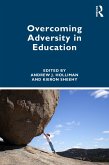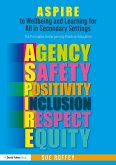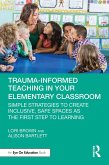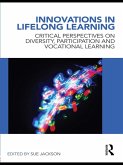42,95 €
42,95 €
inkl. MwSt.
Sofort per Download lieferbar

21 °P sammeln
42,95 €
Als Download kaufen

42,95 €
inkl. MwSt.
Sofort per Download lieferbar

21 °P sammeln
Jetzt verschenken
Alle Infos zum eBook verschenken
42,95 €
inkl. MwSt.
Sofort per Download lieferbar
Alle Infos zum eBook verschenken

21 °P sammeln
- Format: ePub
- Merkliste
- Auf die Merkliste
- Bewerten Bewerten
- Teilen
- Produkt teilen
- Produkterinnerung
- Produkterinnerung

Bitte loggen Sie sich zunächst in Ihr Kundenkonto ein oder registrieren Sie sich bei
bücher.de, um das eBook-Abo tolino select nutzen zu können.
Hier können Sie sich einloggen
Hier können Sie sich einloggen
Sie sind bereits eingeloggt. Klicken Sie auf 2. tolino select Abo, um fortzufahren.

Bitte loggen Sie sich zunächst in Ihr Kundenkonto ein oder registrieren Sie sich bei bücher.de, um das eBook-Abo tolino select nutzen zu können.
For more than twenty years, Research on Educational Innovations has helped readers draw distinctions between truly innovative educational programs backed by sound empirical research and faddish policy trends of the day.
- Geräte: eReader
- mit Kopierschutz
- eBook Hilfe
- Größe: 27.92MB
Andere Kunden interessierten sich auch für
![Overcoming Adversity in Education (eBook, ePUB) Overcoming Adversity in Education (eBook, ePUB)]() Overcoming Adversity in Education (eBook, ePUB)36,95 €
Overcoming Adversity in Education (eBook, ePUB)36,95 €![ASPIRE to Wellbeing and Learning for All in Secondary Settings (eBook, ePUB) ASPIRE to Wellbeing and Learning for All in Secondary Settings (eBook, ePUB)]() Sue RoffeyASPIRE to Wellbeing and Learning for All in Secondary Settings (eBook, ePUB)21,95 €
Sue RoffeyASPIRE to Wellbeing and Learning for All in Secondary Settings (eBook, ePUB)21,95 €![Trauma-Informed Teaching in Your Elementary Classroom (eBook, ePUB) Trauma-Informed Teaching in Your Elementary Classroom (eBook, ePUB)]() Lori BrownTrauma-Informed Teaching in Your Elementary Classroom (eBook, ePUB)21,95 €
Lori BrownTrauma-Informed Teaching in Your Elementary Classroom (eBook, ePUB)21,95 €![Michel Foucault and Education Policy Analysis (eBook, ePUB) Michel Foucault and Education Policy Analysis (eBook, ePUB)]() Michel Foucault and Education Policy Analysis (eBook, ePUB)50,95 €
Michel Foucault and Education Policy Analysis (eBook, ePUB)50,95 €![Exploring Well-Being in Schools (eBook, ePUB) Exploring Well-Being in Schools (eBook, ePUB)]() John Peter WhiteExploring Well-Being in Schools (eBook, ePUB)37,95 €
John Peter WhiteExploring Well-Being in Schools (eBook, ePUB)37,95 €![Bearing with Strangers (eBook, ePUB) Bearing with Strangers (eBook, ePUB)]() Morten T. KorsgaardBearing with Strangers (eBook, ePUB)40,95 €
Morten T. KorsgaardBearing with Strangers (eBook, ePUB)40,95 €![Innovations in Lifelong Learning (eBook, ePUB) Innovations in Lifelong Learning (eBook, ePUB)]() Innovations in Lifelong Learning (eBook, ePUB)59,95 €
Innovations in Lifelong Learning (eBook, ePUB)59,95 €-
-
-
For more than twenty years, Research on Educational Innovations has helped readers draw distinctions between truly innovative educational programs backed by sound empirical research and faddish policy trends of the day.
Dieser Download kann aus rechtlichen Gründen nur mit Rechnungsadresse in A, B, BG, CY, CZ, D, DK, EW, E, FIN, F, GR, HR, H, IRL, I, LT, L, LR, M, NL, PL, P, R, S, SLO, SK ausgeliefert werden.
Produktdetails
- Produktdetails
- Verlag: Taylor & Francis eBooks
- Seitenzahl: 210
- Erscheinungstermin: 17. Juni 2016
- Englisch
- ISBN-13: 9781317207061
- Artikelnr.: 45260675
- Verlag: Taylor & Francis eBooks
- Seitenzahl: 210
- Erscheinungstermin: 17. Juni 2016
- Englisch
- ISBN-13: 9781317207061
- Artikelnr.: 45260675
- Herstellerkennzeichnung Die Herstellerinformationen sind derzeit nicht verfügbar.
Arthur K. Ellis is Professor of Education and Director of the Center for Global Curriculum Studies at Seattle Pacific University. Previously, he taught in public schools in Oregon and Washington and as a Full Professor at the University of Minnesota. He is the author or coauthor of 21 published books and numerous journal articles, book chapters, and scholarly papers. He consults to numerous government and private agencies and foundations and to various school systems in the United States and abroad. He holds academic appointments as Corresponding Professor at universities in Europe and Asia.
John B. Bond is Associate Professor of Educational Leadership at Seattle Pacific University where he teaches in the principal and superintendent certification programs. He served as a public school principal and central office administrator for over 25 years prior to moving to higher education in 2008. His scholarly publications have primarily been in the area of formative assessment.
Table of Contents
1. Innovation Defined and Described
2. What Research is of Most Worth?
-Scientifically-Based, Evidence-Based, or What?
-The Current Scene
-Conclusion
3. Nature of Educational Innovation
-What is Innovation?
-Where are They Now?
-Research Based?
-How Educational Theories Develop
-Level I
-Level II
-Level III
-Conclusion
4. The Structure of Educational Innovation
-Reaping the Whirlwind
- The Hunter Model: ''One More Such Victory and We Are Undone"
-In Retrospect
5. "The Research Says..."
-What "Kind" of Research?
-Level I Research
-Level II Research
-Level III Research
-Summary
-The Following Chapters
6. Setting Standards: The Age of Common Core
-What Standards?
-It Was Better in the Old Days, or Was It?
-Plus ca Change, Plus C'est la Meme Chose
-The Movement Gathers Steam
-Accountability and Standards
-Points of Origin: Level I
-Essentialist Goals, Progressive Means
-Research at Levels II and III
-The Critics' Corner
-Where Does This Leave Us?
7. Innovations From Brain Research
-Collaboration Between Educators and Neuroscientists
-The Pendulum is Well Into Its Swing
-Neuromyths in Education
-Examples of Neuromyths
-Research-based or Faddism?
-Brain-based Learning
-Research on Education and the Brain
-MRIs and the 'Black Box'
-Concepts and Implications
-IQ & Testing
-Pressure of Funding
-Conclusion
8. Assessment
-Alternative Assessment
-Traditional Measures
-Authentic Assessment
-Alternative Assessment Strategies
-Levels II and III Research
-Conclusion
9. Self-Esteem and Self-Efficacy
-What is Self-Esteem?
-The Claims and the Programs
-A New Vaccine or a Fad?
-Research on Self-esteem and Self-efficacy
-Level I Research
-Level II Research
-Level III Research
-Conclusion
10. Direct Instruction
-What is Direct Instruction?
-The Critics
-The Research Base for Direct Instruction
-Level I Research
-Levels II and III Research
-Conclusion
11. Cooperative Learning
-Cooperative Learning Models
-Learning Together
-Student Team Learning
-Other Models
-Forming the Groups
-The Research Base for Cooperative Learning
-Theory Building
-Empirical Studies
-Application to Higher Education
-International
-Variety of Content Areas
-Quasi-experimental
-Program Evaluation
-Conclusion
Snapshot One: Mastery Learning
-Reductionism at Work
-What About the Research?
-Conclusion
Snapshot Two: Curriculum Integration
-What is Curriculum Integration
-History
-Theory-Level I
-Research-Bold Claims, Little Evidence
-Conclusion
Snapshot Three: Teaching for Intelligence
-What is Intelligence?
-Charles Spearman
-L.L. Thurstone
-Richard Hernstein and Charles Murray
-Daniel Goleman
-Reuven Feuerstein
-Howard Gardner
-Robert Sternberg
-Conclusion
Snapshot Four: Instructional Time
-Research on Instructional Time
-Elena Silva
-Tom Loveless
-Conclusion
Snapshot Five: Reflective Assessment
-"I Learned" Statements
-Think Aloud Strategy
-Clear & Unclear Windows
-Journaling
-Theory
-Research II & III
-Black and Wiliam
-Wang, Haertel, and Walberg
-Dignath and Büttner
-Michalsky, Mevarech, and Haibi
-Conclusion
Snapshot Six: Project Based Learning
-Level I Theory
-Level II and III Research
-Walter and Leary (2009)
-Koparan & Guven (2015)
-Finkelstein and colleagues (2011)
-White and Frederiksen (1998)
-Conclusion
Snapshot Seven: The Call for Free Preschool
-Level I: The Theory
-Level II: Longitudinal Studies
-Perry Preschool Project
-Carolina Abecedarian Project
-The Long Shadow
-Level III Research
-Janicki and Banicky
-Greenberg and Domitrovich
-Slaby, Loucks, and Stelwagon
-Conclusion
Snapshot Eight: Engaging Parents
-Level I
-Level II
-Castro and colleagues
-William H. Jeynes
-University of New Hampshire
-Anne Henderson
-Level III
-Conclusion
Snapshot Nine: Teacher Evaluation and Student Achievement
-The Theory-Level I
-The Research
-American Statistical Association (2014)
-Polikoff & Porter (2014)
-Edward Haertel (2013)
-Concluding Thoughts
Snapshot Ten: The Flipped Classroom
-What is Flipped Learning?
-Level I Theory
-Level II Research
-Bishop and Verleger (2013)
-Jensen, Kummer, & Godoy (2015)
-Langdon, Sturges, & Scholte (2015)
-McEvoy and colleagues (2014)
-Shu (2015)
-Level III Research
-Conclusion
Epilogue
-The Graveyard of Lost Ships
-Beyond Empiricism
-Research Questions to Ask
-A Closing Thought
1. Innovation Defined and Described
2. What Research is of Most Worth?
-Scientifically-Based, Evidence-Based, or What?
-The Current Scene
-Conclusion
3. Nature of Educational Innovation
-What is Innovation?
-Where are They Now?
-Research Based?
-How Educational Theories Develop
-Level I
-Level II
-Level III
-Conclusion
4. The Structure of Educational Innovation
-Reaping the Whirlwind
- The Hunter Model: ''One More Such Victory and We Are Undone"
-In Retrospect
5. "The Research Says..."
-What "Kind" of Research?
-Level I Research
-Level II Research
-Level III Research
-Summary
-The Following Chapters
6. Setting Standards: The Age of Common Core
-What Standards?
-It Was Better in the Old Days, or Was It?
-Plus ca Change, Plus C'est la Meme Chose
-The Movement Gathers Steam
-Accountability and Standards
-Points of Origin: Level I
-Essentialist Goals, Progressive Means
-Research at Levels II and III
-The Critics' Corner
-Where Does This Leave Us?
7. Innovations From Brain Research
-Collaboration Between Educators and Neuroscientists
-The Pendulum is Well Into Its Swing
-Neuromyths in Education
-Examples of Neuromyths
-Research-based or Faddism?
-Brain-based Learning
-Research on Education and the Brain
-MRIs and the 'Black Box'
-Concepts and Implications
-IQ & Testing
-Pressure of Funding
-Conclusion
8. Assessment
-Alternative Assessment
-Traditional Measures
-Authentic Assessment
-Alternative Assessment Strategies
-Levels II and III Research
-Conclusion
9. Self-Esteem and Self-Efficacy
-What is Self-Esteem?
-The Claims and the Programs
-A New Vaccine or a Fad?
-Research on Self-esteem and Self-efficacy
-Level I Research
-Level II Research
-Level III Research
-Conclusion
10. Direct Instruction
-What is Direct Instruction?
-The Critics
-The Research Base for Direct Instruction
-Level I Research
-Levels II and III Research
-Conclusion
11. Cooperative Learning
-Cooperative Learning Models
-Learning Together
-Student Team Learning
-Other Models
-Forming the Groups
-The Research Base for Cooperative Learning
-Theory Building
-Empirical Studies
-Application to Higher Education
-International
-Variety of Content Areas
-Quasi-experimental
-Program Evaluation
-Conclusion
Snapshot One: Mastery Learning
-Reductionism at Work
-What About the Research?
-Conclusion
Snapshot Two: Curriculum Integration
-What is Curriculum Integration
-History
-Theory-Level I
-Research-Bold Claims, Little Evidence
-Conclusion
Snapshot Three: Teaching for Intelligence
-What is Intelligence?
-Charles Spearman
-L.L. Thurstone
-Richard Hernstein and Charles Murray
-Daniel Goleman
-Reuven Feuerstein
-Howard Gardner
-Robert Sternberg
-Conclusion
Snapshot Four: Instructional Time
-Research on Instructional Time
-Elena Silva
-Tom Loveless
-Conclusion
Snapshot Five: Reflective Assessment
-"I Learned" Statements
-Think Aloud Strategy
-Clear & Unclear Windows
-Journaling
-Theory
-Research II & III
-Black and Wiliam
-Wang, Haertel, and Walberg
-Dignath and Büttner
-Michalsky, Mevarech, and Haibi
-Conclusion
Snapshot Six: Project Based Learning
-Level I Theory
-Level II and III Research
-Walter and Leary (2009)
-Koparan & Guven (2015)
-Finkelstein and colleagues (2011)
-White and Frederiksen (1998)
-Conclusion
Snapshot Seven: The Call for Free Preschool
-Level I: The Theory
-Level II: Longitudinal Studies
-Perry Preschool Project
-Carolina Abecedarian Project
-The Long Shadow
-Level III Research
-Janicki and Banicky
-Greenberg and Domitrovich
-Slaby, Loucks, and Stelwagon
-Conclusion
Snapshot Eight: Engaging Parents
-Level I
-Level II
-Castro and colleagues
-William H. Jeynes
-University of New Hampshire
-Anne Henderson
-Level III
-Conclusion
Snapshot Nine: Teacher Evaluation and Student Achievement
-The Theory-Level I
-The Research
-American Statistical Association (2014)
-Polikoff & Porter (2014)
-Edward Haertel (2013)
-Concluding Thoughts
Snapshot Ten: The Flipped Classroom
-What is Flipped Learning?
-Level I Theory
-Level II Research
-Bishop and Verleger (2013)
-Jensen, Kummer, & Godoy (2015)
-Langdon, Sturges, & Scholte (2015)
-McEvoy and colleagues (2014)
-Shu (2015)
-Level III Research
-Conclusion
Epilogue
-The Graveyard of Lost Ships
-Beyond Empiricism
-Research Questions to Ask
-A Closing Thought
Table of Contents
1. Innovation Defined and Described
2. What Research is of Most Worth?
-Scientifically-Based, Evidence-Based, or What?
-The Current Scene
-Conclusion
3. Nature of Educational Innovation
-What is Innovation?
-Where are They Now?
-Research Based?
-How Educational Theories Develop
-Level I
-Level II
-Level III
-Conclusion
4. The Structure of Educational Innovation
-Reaping the Whirlwind
- The Hunter Model: ''One More Such Victory and We Are Undone"
-In Retrospect
5. "The Research Says..."
-What "Kind" of Research?
-Level I Research
-Level II Research
-Level III Research
-Summary
-The Following Chapters
6. Setting Standards: The Age of Common Core
-What Standards?
-It Was Better in the Old Days, or Was It?
-Plus ca Change, Plus C'est la Meme Chose
-The Movement Gathers Steam
-Accountability and Standards
-Points of Origin: Level I
-Essentialist Goals, Progressive Means
-Research at Levels II and III
-The Critics' Corner
-Where Does This Leave Us?
7. Innovations From Brain Research
-Collaboration Between Educators and Neuroscientists
-The Pendulum is Well Into Its Swing
-Neuromyths in Education
-Examples of Neuromyths
-Research-based or Faddism?
-Brain-based Learning
-Research on Education and the Brain
-MRIs and the 'Black Box'
-Concepts and Implications
-IQ & Testing
-Pressure of Funding
-Conclusion
8. Assessment
-Alternative Assessment
-Traditional Measures
-Authentic Assessment
-Alternative Assessment Strategies
-Levels II and III Research
-Conclusion
9. Self-Esteem and Self-Efficacy
-What is Self-Esteem?
-The Claims and the Programs
-A New Vaccine or a Fad?
-Research on Self-esteem and Self-efficacy
-Level I Research
-Level II Research
-Level III Research
-Conclusion
10. Direct Instruction
-What is Direct Instruction?
-The Critics
-The Research Base for Direct Instruction
-Level I Research
-Levels II and III Research
-Conclusion
11. Cooperative Learning
-Cooperative Learning Models
-Learning Together
-Student Team Learning
-Other Models
-Forming the Groups
-The Research Base for Cooperative Learning
-Theory Building
-Empirical Studies
-Application to Higher Education
-International
-Variety of Content Areas
-Quasi-experimental
-Program Evaluation
-Conclusion
Snapshot One: Mastery Learning
-Reductionism at Work
-What About the Research?
-Conclusion
Snapshot Two: Curriculum Integration
-What is Curriculum Integration
-History
-Theory-Level I
-Research-Bold Claims, Little Evidence
-Conclusion
Snapshot Three: Teaching for Intelligence
-What is Intelligence?
-Charles Spearman
-L.L. Thurstone
-Richard Hernstein and Charles Murray
-Daniel Goleman
-Reuven Feuerstein
-Howard Gardner
-Robert Sternberg
-Conclusion
Snapshot Four: Instructional Time
-Research on Instructional Time
-Elena Silva
-Tom Loveless
-Conclusion
Snapshot Five: Reflective Assessment
-"I Learned" Statements
-Think Aloud Strategy
-Clear & Unclear Windows
-Journaling
-Theory
-Research II & III
-Black and Wiliam
-Wang, Haertel, and Walberg
-Dignath and Büttner
-Michalsky, Mevarech, and Haibi
-Conclusion
Snapshot Six: Project Based Learning
-Level I Theory
-Level II and III Research
-Walter and Leary (2009)
-Koparan & Guven (2015)
-Finkelstein and colleagues (2011)
-White and Frederiksen (1998)
-Conclusion
Snapshot Seven: The Call for Free Preschool
-Level I: The Theory
-Level II: Longitudinal Studies
-Perry Preschool Project
-Carolina Abecedarian Project
-The Long Shadow
-Level III Research
-Janicki and Banicky
-Greenberg and Domitrovich
-Slaby, Loucks, and Stelwagon
-Conclusion
Snapshot Eight: Engaging Parents
-Level I
-Level II
-Castro and colleagues
-William H. Jeynes
-University of New Hampshire
-Anne Henderson
-Level III
-Conclusion
Snapshot Nine: Teacher Evaluation and Student Achievement
-The Theory-Level I
-The Research
-American Statistical Association (2014)
-Polikoff & Porter (2014)
-Edward Haertel (2013)
-Concluding Thoughts
Snapshot Ten: The Flipped Classroom
-What is Flipped Learning?
-Level I Theory
-Level II Research
-Bishop and Verleger (2013)
-Jensen, Kummer, & Godoy (2015)
-Langdon, Sturges, & Scholte (2015)
-McEvoy and colleagues (2014)
-Shu (2015)
-Level III Research
-Conclusion
Epilogue
-The Graveyard of Lost Ships
-Beyond Empiricism
-Research Questions to Ask
-A Closing Thought
1. Innovation Defined and Described
2. What Research is of Most Worth?
-Scientifically-Based, Evidence-Based, or What?
-The Current Scene
-Conclusion
3. Nature of Educational Innovation
-What is Innovation?
-Where are They Now?
-Research Based?
-How Educational Theories Develop
-Level I
-Level II
-Level III
-Conclusion
4. The Structure of Educational Innovation
-Reaping the Whirlwind
- The Hunter Model: ''One More Such Victory and We Are Undone"
-In Retrospect
5. "The Research Says..."
-What "Kind" of Research?
-Level I Research
-Level II Research
-Level III Research
-Summary
-The Following Chapters
6. Setting Standards: The Age of Common Core
-What Standards?
-It Was Better in the Old Days, or Was It?
-Plus ca Change, Plus C'est la Meme Chose
-The Movement Gathers Steam
-Accountability and Standards
-Points of Origin: Level I
-Essentialist Goals, Progressive Means
-Research at Levels II and III
-The Critics' Corner
-Where Does This Leave Us?
7. Innovations From Brain Research
-Collaboration Between Educators and Neuroscientists
-The Pendulum is Well Into Its Swing
-Neuromyths in Education
-Examples of Neuromyths
-Research-based or Faddism?
-Brain-based Learning
-Research on Education and the Brain
-MRIs and the 'Black Box'
-Concepts and Implications
-IQ & Testing
-Pressure of Funding
-Conclusion
8. Assessment
-Alternative Assessment
-Traditional Measures
-Authentic Assessment
-Alternative Assessment Strategies
-Levels II and III Research
-Conclusion
9. Self-Esteem and Self-Efficacy
-What is Self-Esteem?
-The Claims and the Programs
-A New Vaccine or a Fad?
-Research on Self-esteem and Self-efficacy
-Level I Research
-Level II Research
-Level III Research
-Conclusion
10. Direct Instruction
-What is Direct Instruction?
-The Critics
-The Research Base for Direct Instruction
-Level I Research
-Levels II and III Research
-Conclusion
11. Cooperative Learning
-Cooperative Learning Models
-Learning Together
-Student Team Learning
-Other Models
-Forming the Groups
-The Research Base for Cooperative Learning
-Theory Building
-Empirical Studies
-Application to Higher Education
-International
-Variety of Content Areas
-Quasi-experimental
-Program Evaluation
-Conclusion
Snapshot One: Mastery Learning
-Reductionism at Work
-What About the Research?
-Conclusion
Snapshot Two: Curriculum Integration
-What is Curriculum Integration
-History
-Theory-Level I
-Research-Bold Claims, Little Evidence
-Conclusion
Snapshot Three: Teaching for Intelligence
-What is Intelligence?
-Charles Spearman
-L.L. Thurstone
-Richard Hernstein and Charles Murray
-Daniel Goleman
-Reuven Feuerstein
-Howard Gardner
-Robert Sternberg
-Conclusion
Snapshot Four: Instructional Time
-Research on Instructional Time
-Elena Silva
-Tom Loveless
-Conclusion
Snapshot Five: Reflective Assessment
-"I Learned" Statements
-Think Aloud Strategy
-Clear & Unclear Windows
-Journaling
-Theory
-Research II & III
-Black and Wiliam
-Wang, Haertel, and Walberg
-Dignath and Büttner
-Michalsky, Mevarech, and Haibi
-Conclusion
Snapshot Six: Project Based Learning
-Level I Theory
-Level II and III Research
-Walter and Leary (2009)
-Koparan & Guven (2015)
-Finkelstein and colleagues (2011)
-White and Frederiksen (1998)
-Conclusion
Snapshot Seven: The Call for Free Preschool
-Level I: The Theory
-Level II: Longitudinal Studies
-Perry Preschool Project
-Carolina Abecedarian Project
-The Long Shadow
-Level III Research
-Janicki and Banicky
-Greenberg and Domitrovich
-Slaby, Loucks, and Stelwagon
-Conclusion
Snapshot Eight: Engaging Parents
-Level I
-Level II
-Castro and colleagues
-William H. Jeynes
-University of New Hampshire
-Anne Henderson
-Level III
-Conclusion
Snapshot Nine: Teacher Evaluation and Student Achievement
-The Theory-Level I
-The Research
-American Statistical Association (2014)
-Polikoff & Porter (2014)
-Edward Haertel (2013)
-Concluding Thoughts
Snapshot Ten: The Flipped Classroom
-What is Flipped Learning?
-Level I Theory
-Level II Research
-Bishop and Verleger (2013)
-Jensen, Kummer, & Godoy (2015)
-Langdon, Sturges, & Scholte (2015)
-McEvoy and colleagues (2014)
-Shu (2015)
-Level III Research
-Conclusion
Epilogue
-The Graveyard of Lost Ships
-Beyond Empiricism
-Research Questions to Ask
-A Closing Thought







